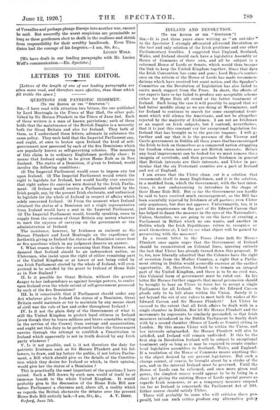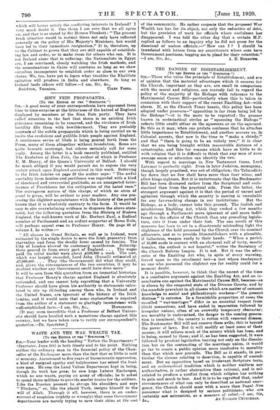IRELAND AND DEVOLUTION. [TO THE EDITOR OF THE " SPECTATOR."]
SIR,—It is just three years since writing as "an outsider e to the Spectator I strongly advocated all-round Devolution as the best and only solution of the Irish problems and our other Parliamentary troubles. I suggested that England, Scotland, Wales, and Ireland should each have a legislative Assembly or House of Commons of their own, and all be subject to a reformed House of Lords or Senate, which would thus become the link to keep the United Kingdom together. Since that date the Irish Convention has come and gone; Lord Bryce's confer- ence on the reform of the House of Lords has made recommen- dations which have received but scant notice, and the Speaker's Committee on the Devolution of Legislation has also failed to excite much support from the Press. In short, the efforts of our experts have so far failed to produce any acceptable scheme either for Home Rule all round or the better treatment of Ireland. Such being the case it will possibly be argued that we had better muddle along as we are doing at Westminster, and for Ireland to continue to search for some exceptional treat- ment which will silence the Americans, and not be altogether rejected by the majority of Irishmen. I am not an Irishman or an expert on Irish subjects, but I contend, nevertheless, that it is just this constant cry for exceptional legislation for Ireland that has brought us to the present impasse. I will go further and say that it is the presence of the Viceroy and Castle government in Dublin all these years thathasencouraged the Irish to look on themselves as a conquered nation struggling for freedom whose interests are not British interests. Before any local improvement can be looked for we must remove these insignia of servitude, and then persuade Irishmen in general that British interests are their interests, and Ulster in par- ticular that the six Protestant counties are a part of Ireland and not of England.
I am aware that the Ulster clean cut is a solution' that recommends itself to many Englishmen, and it is the solution, in a modified form, which the Government, with the best inten- tions, is now endeavouring to introduce in the shape of their Home Rule Bill. But so far the Government can hardly be said to have received much encouragement, as the Bill has been scornfully rejected by Irishmen of all parties; even Ulster only acquiesces, but does not approve. Unfortunately, too, it is just this acquiescence on the part of Sir Edward Carson that has helped to damn the measure in the eyes of the Nationalist.. Unless, therefore, we are going to see the farce of creating a Parliament in Belfast which no one wants, and another in Dublin which the Irish Republicans. refuse to. recognise or avail themselves of, I fail to see what object will be gained by persevering with the measure?
In a recent letter to the Times (June 2nd) Sir Horace Plunkett once again urges that the Government of Ireland should be reconstituted on Colonial lines, ignoring entirely the fact that Ulster has already turned down this proposal. It is, too, now liberally admitted that the Colonies have the right of secession from the Mother Country, a right that a Parlia- ment sitting in Dublin would assuredly exercise at the earliest opportunity. If, therefore, Ireland is to remain an integral part of the United Kingdom, and there is to be no civil war, this Colonial form of government must be ruled out. In, his letter Sir Horace further suggests that moral persuasion should be brought to bear on Ulster to force her to accept a single Parliament for all Ireland. On his side Sir Edward Carson pleads only to be left alone within the Union. Surely it is not beyond the wit of our rulers to meet both the wishes of Sir Edward Carson and Sir Horace Plunkett? Let Ulster be coerced to the extent that all Irish affairs be dealt with in a single chamber in Dublin. But let Sir Horace. Plunkett and the movements he represents be similarly persuaded, so that Irish measures introduced in the Dublin Parliament be finally dealt with by a second chamber (House of Lords or Senate) sitting in London. By this means Ulster will be within the Union, and her interests safeguarded. Sir Horace Plunkett will also be satisfied, and Ireland will remain undivided. If this be the first step in Devolution Ireland will be subject to exceptional treatment only so long as it may be required to create similar local legislative assemblies in Scotland, Wales, and England. If a resolution of the House of Commons means anything this is the object desired by our present legislators. But such a change cannot, of course, be brought about by a stroke of the pen, and in the interval Ireland must be governed. Until the House of Lords can be reformed, and once more given real power, the simplest course would appear to be to bring in a short Act giving the existing House of Lords special powers as regards Irish measures, or as a temporary measure suspend (so far as Ireland is concerned) the Parliament Act of 1911. Either course should satisfy Ulster.
There will probably be some who will criticise these pro- posalt, but can such critics produce any alternative policy which will better satisfy the conflicting interests in Ireland? I very much doubt it. One thing I am sure that we all agree on, and that is as stated by Sir Horace Plunkett : "The present 'Irish situation would in normal times not only have reflected generally on the policy of His Majesty's Ministers, but would have led to their immediate resignation." It is, therefore, up to the Cabinet to prove that they are still capable of establish- ing law and order, or to make room for others who can. It is not Ireland alone that is suffering; the Nationalists in Egypt are, I am convinced, closely watching the Irish methods, and the assassinations in Cairo will continue as long as we show ourselves incompetent to establish order so close to our own shores. We, too, have yet to learn what troubles the Khalifate agitation will produce in India and elsewhere. So long as Ireland leads others will follow.—I am, Sir, &c.,







































 Previous page
Previous page